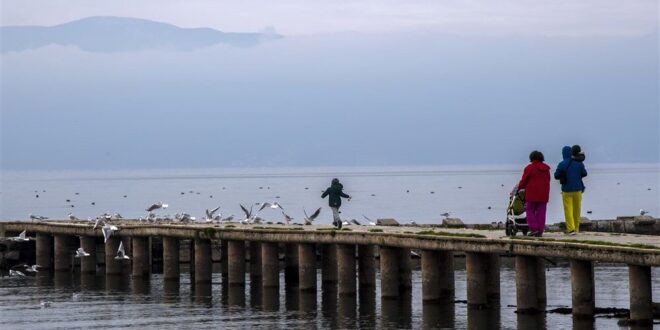Special Representative of the European Union Miroslav Lajčak confirmed today that the next meeting between Kosovo Prime Minister Aljbin Kurti and Serbian President Aleksandar Vučić, with the mediation of EU High Representative for Foreign Policy Josep Borelj, will take place in Ohrid.
Lajčak, after the meeting with the Vice President of the Government of North Macedonia for European Affairs, Bojan Maričik, thanked North Macedonia for the support it is giving to the Kosovo-Serbia dialogue process.
I am grateful to North Macedonia for its strong support for the dialogue and I look forward to the next dialogue meeting in Ohrid at the end of this month.
It was announced that this meeting will be held on March 18, when Borelj is expected to visit North Macedonia.
Deputy Prime Minister of Kosovo Besnik Bisljimi announced on Wednesday evening, during a guest appearance on RTK, the visit of Miroslav Lajčak for next week and announced that the EU envoy had forwarded him 15 models for the protection of minority rights.
We have to see which model suits us, we will not copy, there are models that, logically, cannot be applied in Kosovo, he said.
The next meeting between Kosovo Prime Minister Aljbin Kurti and Serbian President Aleksandar Vučić will be on March 18, where they will discuss the joint annex document, this is the plan, Bisljimi confirmed.
Bisljimi adds that we should wait for March 18 to complete the annex and that it will be seen what the Kosovo side’s proposal is for the Franco-German plan.
According to Bisljimi, the moment the parties agree on the annex, then the EU takes over the signing or finalization procedures.
There will be a ceremony, there is a high chance that all the prime ministers of the 27 EU countries will participate in the ceremony, in order to increase the political commitment of the European Union, which stands behind this document. This is an idea or a plan, that should be arranged by Mr. Borelj, Bisljimi said.
There is no complete normalization without mutual recognition, for us it would be the optimal solution for normalization to happen as soon as possible so that both the citizens of Kosovo and the citizens of the region, as well as the EU itself, would be the ultimate beneficiaries of the normalization of relations between Kosovo and Serbia, Bisljimi said.
Unfortunately, he added, there is only one side that thinks it can benefit from maintaining tensions, rather than normalization, and that is Serbia.
Bisljimi believes that the property of the Serbian Orthodox Church in Kosovo is not threatened and claims that the “common heritage” was also protected by the Albanians, reports Kossev.
We have a very rich heritage in Kosovo, we believe that the heritage of the Serbian Orthodox Church is not threatened either, in fact they were historically protected by the Albanians, it is a common heritage. We can talk based on the Framework of the Council of Europe, Bisljimi said.
Kosovo Prime Minister Aljbin Kurti, staying in Skopje on March 1, assessed that the choice of North Macedonia as the venue for the next meeting within the dialogue between Belgrade and Pristina at a high political level is symbolic.
Kurti saw this symbolism in the fact that in Kumanovo, in North Macedonia, “9. In June 1999, the capitulation of Milošević’s Yugoslavia was signed and the entry of NATO forces”.
Aleksandar Vučić, the President of Serbia, was a guest on RTS, on the evening of February 28, slightly ironically saying that North Macedonia was chosen because (high representative) Jozep Borelj wanted it to be there.
However, despite the connection with the Kumanovo Agreement, the symbolism is more visible when it comes to the Prespa Agreement from 2018.
It is about the agreement that Macedonia and Greece concluded on June 17, 2018 on resolving the dispute over the name, in the town of Psarades on the Greek shore of Lake Prespa, according to which the new name of the Former Yugoslav Republic of Macedonia became the Republic of North Macedonia.
The agreement was signed by the Ministers of Foreign Affairs of the two countries, Nikola Dimitrov and Nikos Kotsias, in the presence of the Prime Ministers of Greece and Macedonia, Alexis Tsipras and Zoran Zaev.
Immediately after signing the “historical agreement” on the new name of Macedonia, Tsipras and Zaev went by speedboat to the opposite coast, to the town of Oteševo, where a working lunch was held.
The two prime ministers had the opportunity to walk along the coast and talk.
Also present were EU Commissioners Federica Mogherini and Johannes Hahn, Special Envoy of the UN Secretary General Matthew Nimitz, EU Commissioners Mogherini and Hahn, UN Undersecretary for Political Affairs Rozmari di Carlo, EU Ambassador in Skopje Samujel Žbogar, Macedonian Minister of Defense Radmila Škerinska Jankovska, for European issues Bujar Osmani…
 Eurasia Press & News
Eurasia Press & News




